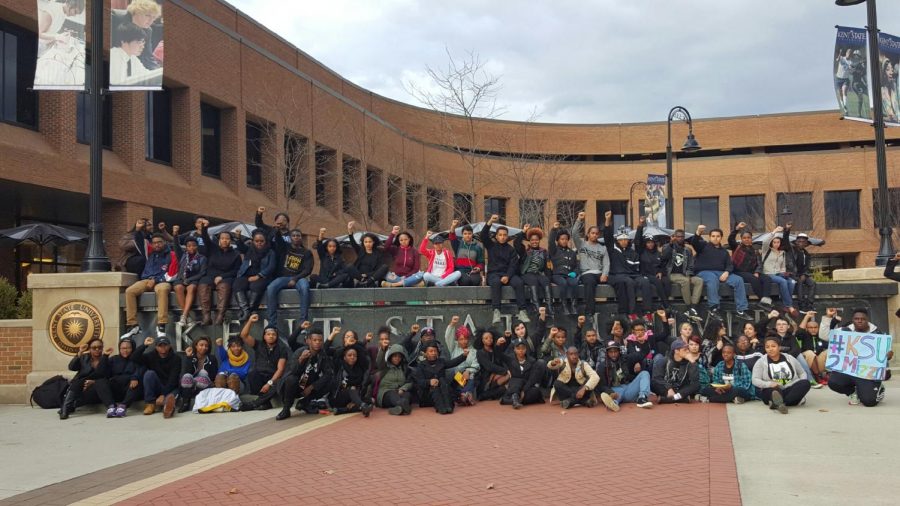Black Lives Matter and race relations at Kent State
November 29, 2015
With the recent protests at the University of Missouri and Black Lives Matter activism across the country, race relations is something many people are starting to pay attention to, including Kent State.
Students at the University of Missouri campus protested systemic racism on campus. The university has had several incidents of discrimination this year, and students said the university has not done anything in response, according to an article by CNN.
The political science department’s Safe Spaces speaker series hosted an event in October called “Why It’s Not ‘All Lives Matter!’ BLM History and Future.”
The event created a safe space to discuss the relevance and importance of the Black Lives Matter movement.
One of the organizers of the panel-style event was political science professor Joshua Stacher. He wanted this event to be a place where people were comfortable talking about controversial issues.
“(There) needs to be a space to hear the communities affected,” Stacher said.
Professor Julie Mazzei, another organizer of the Safe Spaces speaker series, said the series is intended for people to realize and understand “how things interconnect.”
The main issue covered at the Safe Spaces event was why it’s called Black Lives Matter and not All Lives Matter.
“The reality is not that ‘all lives’ do not matter,” Isaac Floyd, president of Black United Students, said. “To counter the Black Lives Matter movement with ‘All Lives Matter’ is disrespectful, belittling to the movement and has a diluting effect on the intended focus and progress,” Floyd said.
The term ‘black lives matter’ has offended people that think the movement is insinuating that not all lives matter.
“All Lives Matter was created to discredit the Black Lives Matter movement,” Kent State alumna Jasmin Sparkman said. “Many people like to think that when the phrase ‘Black Lives Matter’ is used an extra invisible word is added, changing the statement to ‘ONLY Black Lives Matter,” she added.
Panelist Austin McCoy, an organizer of a local Black Lives Matter group and a doctoral candidate in the Department of History at the University of Michigan, answered a question about how white people and other races should be involved in the Black Lives Matter movement.
“It is important for black folks to lead BLM, but is important for white Americans to find ways to use their privilege to help BLM. This could include organizing and conducting conversations about racism and white privilege among other white Americans,” McCoy said.
Kent State and the University of Missouri have the same percentage of African American students making up their student body at eight percent, according to each university’s website.
McCoy believes the only way schools like Kent State can avoid turmoil like the University of Missouri is for the “university’s administration to be vigilant in recruiting and retaining students of color.”
McCoy said it is important for universities to remain vigilant when “monitoring the campus climate: Do students of color and other underrepresented minorities, feel comfortable participating in classroom discussions and campus culture?”
Kent State’s Safe Spaces may be the first step to making minorities feel comfortable talking about their issues and having them recognized.
Gabrielle Woodard is an arts and sciences reporter for The Kent Stater. Contact her at [email protected].

























